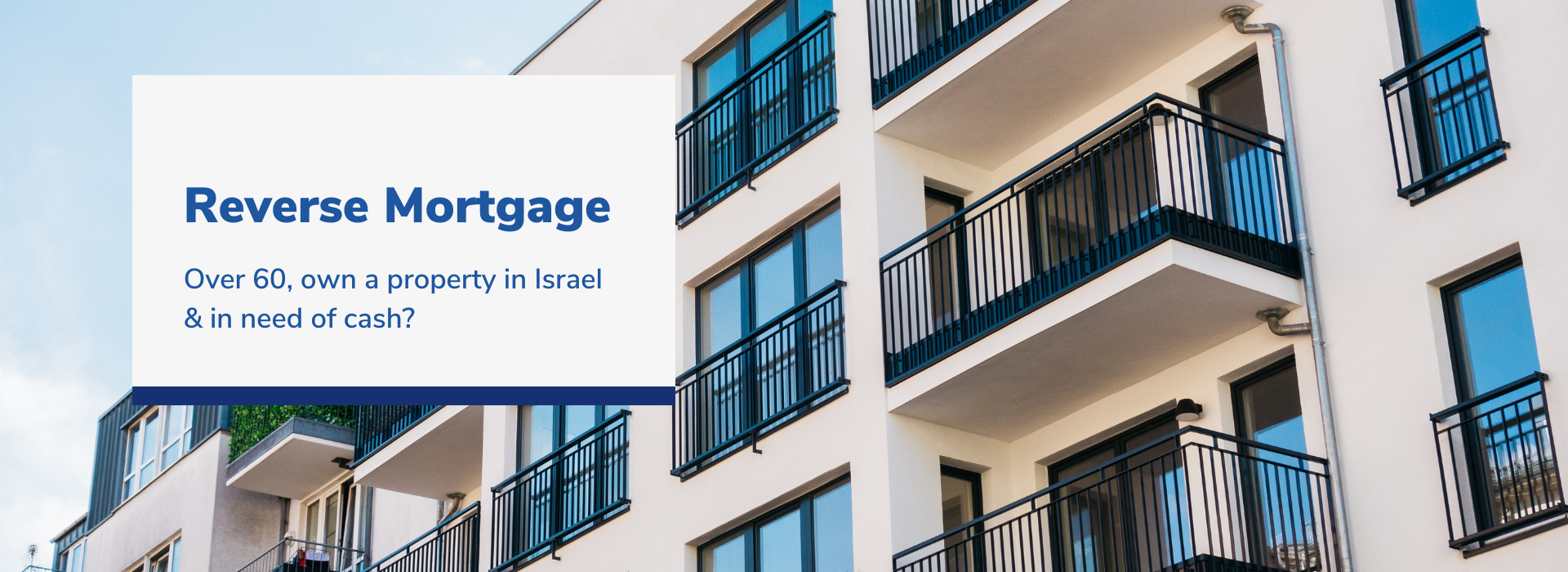

Over 60, own a property in Israel & in need of cash? Whether you are looking to marry off kids, help them buy their own home, make an investment, pay off debts or supplement your own income. A "REVERSE MORTGAGE" provides an easy way to raise money and still hold onto your property!
A reverse mortgage is a special type of loan which is only accessible to Israeli who are at least 60 years old.
The property is used as security for the loan and may not require monthly repayment. Instead, the loan and interest are only due upon the death of the last borrower, whereby the heirs may have the right to repay the loan, or the bank sells the property to recover its money.
Unlike the United States, where 57.2 percent of households own their own homes, in Israel, it is as high as 70 percent.
This is despite the high rate of Israeli housing prices. In July 2011, the average cost for a four-room apartment was about $450,000.
A 2020 study by Compare The Market Australia disclosed that Israel was rated as the second least affordable country for housing, with each square meter (10.8 square feet) of housing space costing the equivalent of 26.6% of the average Israeli household’s annual disposable income.
In June 2021, the average price for a four-room apartment significantly spiked to about $682,608, while analysts expect a further rise, according to a report by the Alrov Institute for Real Estate Research at Tel Aviv University’s Coller School of Management.
The high real estate value means homeowners can access more funds whenever they apply for a reverse mortgage.
Israeli are familiar with reverse mortgages. Private lenders have facilitated it for many years.
A 2006 press statement by the Bank of Israel announcing the end of the tenure of former Deputy Governor, Dr. Meir Sokoler, stated he was “among those who devised the inflation-target regime and one of the initiators of the reverse mortgage (2003)”.
In 2014, former Housing Minister, Uri Ariel, proposed a government-backed reverse mortgage program that would supply homeowners with a monthly income.
As of 2020, the Bank of Israel, in a move to ease the mortgage burden, mandated that a third of any mortgage be repayable with a variable interest rate linked to the prime rate. The remaining two-thirds are repayable at a fixed rate.
Meanwhile, in 2022, the Banking Supervision of the apex bank, headed by Yair Avidan, published a circular to regularize reverse mortgages.
According to the circular, a reverse mortgage will be allowed up to 50 percent of the home's value.
The document also noted that despite reverse mortgage being designed for elderly homeowners, it is now leveraged to finance homes for heirs.
Lenders consider different factors when estimating the reverse mortgage loan, they can offer a homeowner.
The major factors considered are age and home value.
Typically, people who are 60 years old get a loan of about 15 percent of their property value. Homeowners who are 65 years old are eligible for a loan of about 20 percent of the appraised value.
At the age of 80, lenders can offer amounts up to 35 percent of the property, while 90 years old landlords can get as much as 50 percent.
Contact us to get a real-time estimation of how much you can receive based on the value of your home and other factors including your age.
A reverse mortgage is a financial decision that can affect your family because any mistake would be carried over to your heirs when you are gone.
Your home value is crucial in the amount of reverse mortgage a lender will be willing to offer you.
The equivalent equity in the home secures the loan, which is expected to be repaid with interest and fees.
Avoid the mistake of requesting a reverse mortgage more than you need. It is best to borrow little such that your heirs can easily pay it off when you are gone while they would be able to retain ownership of the property.
A reverse mortgage without your spouse as a borrower can be a problem if they outlive you or you have to move to a care facility or nursing home.
In such a case, the spouse may be forced to repay the loan to remain in the home.
It is also essential to inform your heirs about your reverse mortgage plan, which will help them prepare to handle it when you are gone.
Failure to pay required taxes on the home can trigger the nullification of the reverse mortgage terms, making the balance repayable in full immediately.
This could be a major problem if you cannot raise the required fund to settle the lender, as they would have no other choice than to sell the home to repay the debt, even though you are still alive.